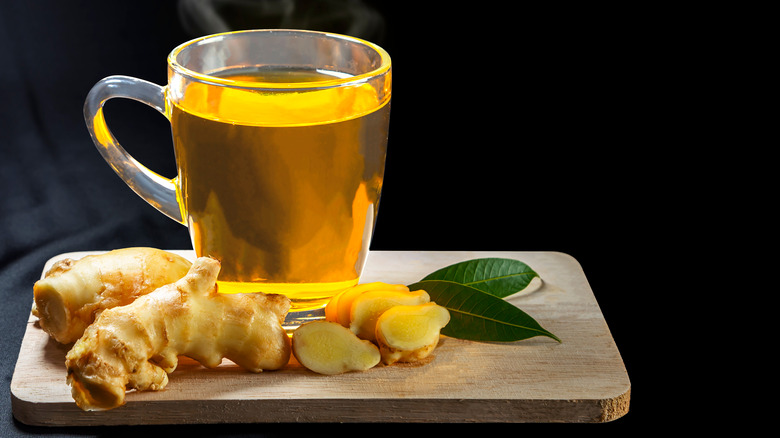What Drinking Ginger Tea Does For Your Body
If you enjoy a cup of ginger tea for its slightly spicy flavor, you're not alone. You might be aware that it's often used for treating nausea and an upset stomach (via the National Institutes of Health), but it also provides several other health benefits for your body.
Research suggests that ginger might help improve heart health and reduce pain. A 2016 study showed that daily consumption reduced the risk of high blood pressure. Additionally, the spice might also help protect against coronary heart disease if ingested regularly. Another 2020 study showed that it reduced inflammation in people who consumed two grams per day. It also performed well as a pain reliever (via Healthline)... and there's more!
There is also promise that ginger might also help lower A1C levels in individuals diagnosed with type 2 diabetes. Evidence suggests that it affects how the body metabolizes carbohydrates, and it has a positive effect on insulin sensitivity. Ginger also lowers lipids, which might reduce the risk of complications stemming from diabetes. That being said, the studies were small and only examined participants for a few months, which means more research is needed (via Everyday Health).
Ginger may affect certain medical conditions
While ginger tea is considered safe for most people, pregnant women should consult with a healthcare professional before drinking it for morning sickness as there is a slim chance that it might increase the risk of miscarriage or a stillborn birth. However, there seems to be enough evidence to suggest that most pregnant women can drink the tea without worry (via WebMD).
Because ginger might decrease the time it takes for blood to clot, individuals taking blood thinners or medications that slow blood clotting, such as aspirin or warfarin, should be aware that they might bruise or bleed easier if they drink ginger tea (via Livestrong).
If you are taking medication to lower blood sugar, you might want to monitor your levels when drinking ginger tea, because they might drop too low. If you have any concerns about drinking this type of tea, check with your doctor first.


